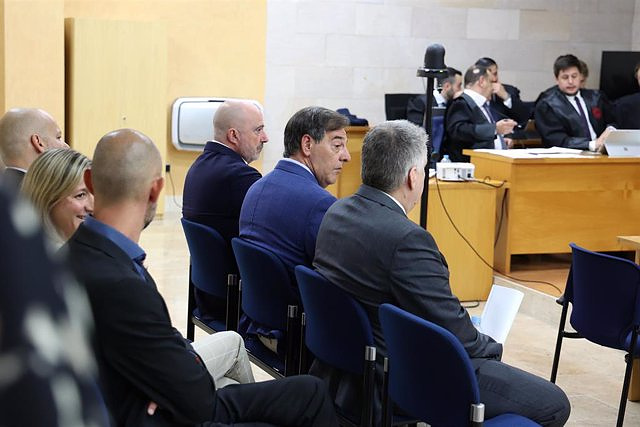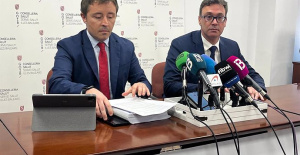For Penalva and Subarán, however, a limit of prison sentences is set at seven and a half years
The Civil and Criminal Chamber of the Superior Court of Justice of the Balearic Islands (TSJIB) notified this Wednesday the sentence, of more than 500 pages, against the investigators of the Cursach case, sentencing Judge Manuel Penalva and the prosecutor Miguel Ángel Subarán.
Specifically, Penalva, for a crime of omission to pursue a crime of revealing secrets, in a degree of criminal continuity, is sentenced to two years of special disqualification for employment and public office.
Furthermore, as the author responsible for three crimes of obstruction of justice, he is sentenced to two and a half years in prison for each of the first two and the same sentence, plus one day in prison, for the third, and as the author of a crime of coercion in person of the former PP politician Álvaro Gijón, to a year and a half in prison.
The total sentences imposed amount to nine years and one day in prison. However, the limit of sentences is set at seven years, six months and three days in prison. He is acquitted of the rest of the crimes charged.
Prosecutor Miguel Ángel Subírán is sentenced to two years of disqualification as responsible for a crime of omission to pursue a crime of revealing secrets.
On the other hand, as the author responsible for three crimes of obstruction of justice, he is sentenced to two and a half years in prison for the first two and the same sentence, but with one more day in prison, for the third, and for a crime of coercion in person of the former PP politician Álvaro Gijón to a year and a half in prison.
The total of his sentence amounts to nine years and one day in prison. However, he also sets the limit of the sentences at seven years, six months and three days in prison, and is acquitted of the rest of the crimes that are the subject of the accusation.
THREE POLICE OFFICERS CONVICTED
Four members of the National Police Corps of the Money Laundering Group also sat on the bench, specifically Chief Inspector José Luis García Reguera, Sub-Inspector Miguel Ángel Blanco, Sub-Inspector Blanca Ruiz and Police Officer Iván Bandera.
The first of them has been acquitted as the Court considered that there was not enough evidence for his conviction.
Miguel Ángel Blanco is sentenced, for a crime of obstruction of justice and coercion of Álvaro Gijón, to three years and ten months in prison.
Blanca Ruiz is sentenced, for a crime of obstruction of justice, to one year and two months in prison.
And Iván Bandera is sentenced, for a crime of obstruction of justice and another of coercion of Álvaro Gijón, to a total of two years and four months in prison.
On the other hand, all convicted defendants are imposed as an accessory penalty that of special disqualification for the exercise of their employment or public office as police officials and as judge and prosecutor, for the time established as the duration of the custodial sentences. of freedom.
Furthermore, through civil liability, Penalva, Subírán, Blanco and Bandera must jointly and severally compensate Álvaro Gijón in the amount of 6,500 euros for moral damages.
As a fine, the payment of more than 16,000 euros is imposed on Penalva and Subírán -each--, nearly 3,000 euros on Blanco and more than 1,000 euros on Ruiz and Bandera -each--. All this, plus procedural costs.
Likewise, the ruling concludes that it is not possible to deduce testimony against a witness for the alleged commission of a crime of false testimony in the trial, as there are no reasons for it.
It is noted that an appeal may be filed against said resolution before the Second Chamber of the Supreme Court within a period of five days from the last notification of the ruling.
BACKGROUND
For weeks, the judge and the prosecutor in the case, Manuel Penalva and Miguel Ángel Subírán, sat on the bench, as well as four members of the National Police Corps of the Money Laundering Group, specifically Chief Inspector José Luis García Reguera, sub-inspector Miguel Ángel Blanco, sub-inspector Blanca Ruiz and police officer Iván Bandera.
Throughout the sessions, hundreds of witnesses, including police officers, protected witnesses, businessmen and journalists, passed through the courtroom, whose statements occupied more than 20 sessions.
Previous days were also dedicated to the statements of the accused and, previously, to the presentation of the preliminary questions, as a result of which part of the evidence supporting the accusations was annulled.
Specifically, the Court ruled, among other issues, that the findings obtained from the police's phones in relation to the 'Sancus' chat could not be assessed as evidence in anything that had to do with leaks to the media.
In its more than 30-page document, the Anti-Corruption Prosecutor's Office attributed Penalva and Subarán with crimes of revealing secrets, obstruction of justice, illegal detention, prevarication and inducing false testimony, requesting 118 and 121 years in prison for both, respectively. He also requested 162 years of disqualification and a 59,400 euro fine for Penalva and 162 years of disqualification and a 72,600 euro fine for Subarán. The brief indicated the instructions for the Cursach, ORA, IME and Madame cases.
Furthermore, for the Laundering Group he requested, for crimes of revealing secrets, illegal detention, prevarication and obstruction of justice, sentences that totaled more than 340 years in prison.
These requests for prison were joined by those presented by Bartolomé Cursach's lawyers, Bartolomé Sbert, Jaime Lladó and Antonio Bergas. In the letter, they demanded sentences of more than 200 years in prison and 338 years of disqualification, and fines that together amounted to 2.3 million euros for continued crimes of revealing secrets, obstruction of justice, omission of the duty to prosecute crimes , prevarication and coercion.
Throughout the 32 pages of the document, signed by prosecutors Tomás Herranz and Fernando Bermejo, the Public Prosecutor's Office located between 2013 and 2018 how the Investigative Court number 12 of Palma followed several criminal procedures for the investigation of different events in which the six defendants intervened.
On the aforementioned dates, the Public Prosecutor's Office also described how the media disclosed information from the judicial investigations of the Cursach, ORA and IME case with information "provided by the accused and without preventing or preventing its disclosure or investigating who leaked the information." . In detail, the document detailed information published in different media in the Balearic Islands, with the case being under summary secrecy.
In addition, the Prosecutor's Office maintained that the arrests of 15 people in the ORA case were carried out after testimony "of completely inconcrete and speculative content." He indicated that after "a very poor investigation," the accused made arrests, put pressure on detainees, those under investigation and witnesses, and sent them to prison.
The Prosecutor's Office also alluded to the arrest of the former PP politician Álvaro Gijón, his brother and his parents with the motivation of "pressuring and softening him", and to the accusation of each of several "inexplicably" crimes.
The Prosecutor's Office described seven more facts in the judicial instructions of the Cursach case in which it indicates pressure from Penalva, Subírán, Blanco, Bandera, Ruiz and Reguera on different witnesses and detainees, including the general director of the Cursach Group, Bartolomé Sbert.

 Exploring Cardano: Inner Workings and Advantages of this Cryptocurrency
Exploring Cardano: Inner Workings and Advantages of this Cryptocurrency Seville.- Economy.- Innova.- STSA inaugurates its new painting and sealing hangar in San Pablo, for 18 million
Seville.- Economy.- Innova.- STSA inaugurates its new painting and sealing hangar in San Pablo, for 18 million Innova.- More than 300 volunteers join the Andalucía Compromiso Digital network in one month to facilitate access to ICT
Innova.- More than 300 volunteers join the Andalucía Compromiso Digital network in one month to facilitate access to ICT Innova.-AMP.- Ayesa acquires 51% of Sadiel, which will create new technological engineering products and expand markets
Innova.-AMP.- Ayesa acquires 51% of Sadiel, which will create new technological engineering products and expand markets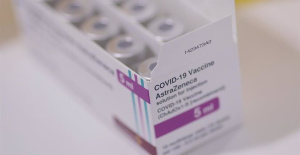 AstraZeneca admits that its Covid vaccine can cause side effects such as thrombosis in "very rare cases"
AstraZeneca admits that its Covid vaccine can cause side effects such as thrombosis in "very rare cases"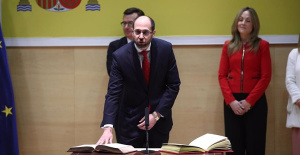 The PP signs the director of the cabinet of the governor of the Bank of Spain for its list for the European elections
The PP signs the director of the cabinet of the governor of the Bank of Spain for its list for the European elections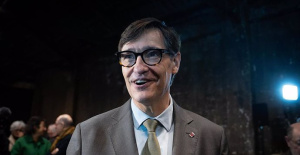 Illa does not rule out agreeing with Junts after the Catalans if they do not prioritize independence
Illa does not rule out agreeing with Junts after the Catalans if they do not prioritize independence Los Angeles Police begin to dismantle the encampment at the University of California
Los Angeles Police begin to dismantle the encampment at the University of California How Blockchain in being used to shape the future
How Blockchain in being used to shape the future Not just BTC and ETH: Here Are Some More Interesting Coins Worth Focusing on
Not just BTC and ETH: Here Are Some More Interesting Coins Worth Focusing on UPV students design an app that helps improve the ventilation of homes in the face of high temperatures
UPV students design an app that helps improve the ventilation of homes in the face of high temperatures Ivace and promotes a less invasive device for the early detection of prostate cancer
Ivace and promotes a less invasive device for the early detection of prostate cancer Valencia unanimously approves the ordinance to allocate spaces to test innovative initiatives
Valencia unanimously approves the ordinance to allocate spaces to test innovative initiatives UPV researchers promote a paid master's degree as a "talent factory" in integrated photonics
UPV researchers promote a paid master's degree as a "talent factory" in integrated photonics A million people demonstrate in France against Macron's pension reform
A million people demonstrate in France against Macron's pension reform Russia launches several missiles against "critical infrastructure" in the city of Zaporizhia
Russia launches several missiles against "critical infrastructure" in the city of Zaporizhia A "procession" remembers the dead of the Calabria shipwreck as bodies continue to wash up on the shore
A "procession" remembers the dead of the Calabria shipwreck as bodies continue to wash up on the shore Prison sentences handed down for three prominent Hong Kong pro-democracy activists
Prison sentences handed down for three prominent Hong Kong pro-democracy activists ETH continues to leave trading platforms, Ethereum balance on exchanges lowest in 3 years
ETH continues to leave trading platforms, Ethereum balance on exchanges lowest in 3 years Investors invest $450 million in Consensys, Ethereum incubator now valued at $7 billion
Investors invest $450 million in Consensys, Ethereum incubator now valued at $7 billion Alchemy Integrates Ethereum L2 Product Starknet to Enhance Web3 Scalability at a Price 100x Lower Than L1 Fees
Alchemy Integrates Ethereum L2 Product Starknet to Enhance Web3 Scalability at a Price 100x Lower Than L1 Fees Mining Report: Bitcoin's Electricity Consumption Declines by 25% in Q1 2022
Mining Report: Bitcoin's Electricity Consumption Declines by 25% in Q1 2022 Oil-to-Bitcoin Mining Firm Crusoe Energy Systems Raised $505 Million
Oil-to-Bitcoin Mining Firm Crusoe Energy Systems Raised $505 Million Microbt reveals the latest Bitcoin mining rigs -- Machines produce up to 126 TH/s with custom 5nm chip design
Microbt reveals the latest Bitcoin mining rigs -- Machines produce up to 126 TH/s with custom 5nm chip design Bitcoin's Mining Difficulty Hits a Lifetime High, With More Than 90% of BTC Supply Issued
Bitcoin's Mining Difficulty Hits a Lifetime High, With More Than 90% of BTC Supply Issued The Biggest Movers are Near, EOS, and RUNE during Friday's Selloff
The Biggest Movers are Near, EOS, and RUNE during Friday's Selloff Global Markets Spooked by a Hawkish Fed and Covid, Stocks and Crypto Gain After Musk Buys Twitter
Global Markets Spooked by a Hawkish Fed and Covid, Stocks and Crypto Gain After Musk Buys Twitter Bitso to offset carbon emissions from the Trading Platform's ERC20, ETH, and BTC Transactions
Bitso to offset carbon emissions from the Trading Platform's ERC20, ETH, and BTC Transactions Draftkings Announces 2022 College Hoops NFT Selection for March Madness
Draftkings Announces 2022 College Hoops NFT Selection for March Madness